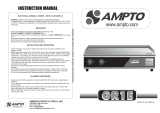
14
Weekly Cleaning
NOTE:
If the range usage is very high, we recommend that the weekly cleaning procedure is
carried out on a more frequent basis.
Ensure that protective gloves are worn during the cleaning process.
DO NOT use harsh abrasive detergents, strong solvents or caustic detergents as they will
damage the Cooktop and elements.
DO NOT use water on the griddle plate (optional - if fitted) while it is still hot as warping
may occur. Allow these items castings to cool and remove for cleaning.
Griddle - Steel Plate (Optional - if fitted)
NOTE: In order to prevent the forming of rust on the griddle plate, ensure that all detergent and
cleaning material has been entirely removed after each cleaning process. The appliance
should be switched on briefly to ensure the griddle plate becomes dry. Oil or grease should
be spread over the griddle surface in order to form a thin protective greasy film.
a. Remove and clean the grease collection drawer frequently to prevent over spills.
b. Clean the griddle surface thoroughly with a scraper tool or a wire brush. If necessary use a
griddle stone or a scotch bright pad on the griddle surface for the removal of stubborn or
accumulated carbon deposits..
c. Occasionally bleach the griddle plate with vinegar when the plate is cold.
d. Clean with hot water, a mild detergent solution and a scrubbing brush. Dry all components
thoroughly with a dry cloth.
e. The griddle should be switched on briefly to ensure that the griddle plate becomes dry. A thin
smear of cooking oil should be spread over the griddle in order to form a protective film.
Radiant Elements and Cooking Area
a. Clean the radiant elements and cooking area with a soft cloth and a mild detergent and hot water
solution.
b. Baked on deposits or discolouration may require a good quality stainless steel cleaner or stainless
steel wool. Always apply cleaner when the appliance is cold.
c. Remove the grease drawer and clean with a mild anti bacterial detergent and hot water solution
using a soft bristled brush. Dry the grease drawer thoroughly with a dry cloth.
d. Clean beneath the elements and the element frame drip trays as shown in ‘Daily Cleaning’ on the
previous page.
Stainless Steel Surfaces
a. Clean the exterior surfaces of the Cooktop with hot water, a mild detergent solution and a soft
scrubbing brush. Note that the control knobs are a push fit onto the control spindles and can be
removed to allow cleaning of the front control panel.
b. Baked on deposits or discolouration may require a good quality stainless steel cleaner or stainless
steel wool. Always apply cleaner when the appliance is cold and rub in the direction of the grain.
c. To remove any discolouration, use an approved stainless steel cleaner or stainless steel wool.
Always rub in the direction of the grain.
d. Remove the grease tray and clean with a mild anti bacterial detergent and hot water solution
using a soft bristled brush.
e. Dry the grease tray thoroughly with a dry cloth.
f. Dry all components thoroughly with a dry cloth and polish with a soft dry cloth.
Periodic Maintenance
To achieve the best results cleaning must be regular and thorough and all controls and mechanical parts
checked and adjusted periodically by a competent serviceman. If any small faults occur, have them
attended to promptly. Don't wait until they cause a complete breakdown. It is recommended that the
appliance is serviced every 6 months.
Cleaning and Maintenance




















